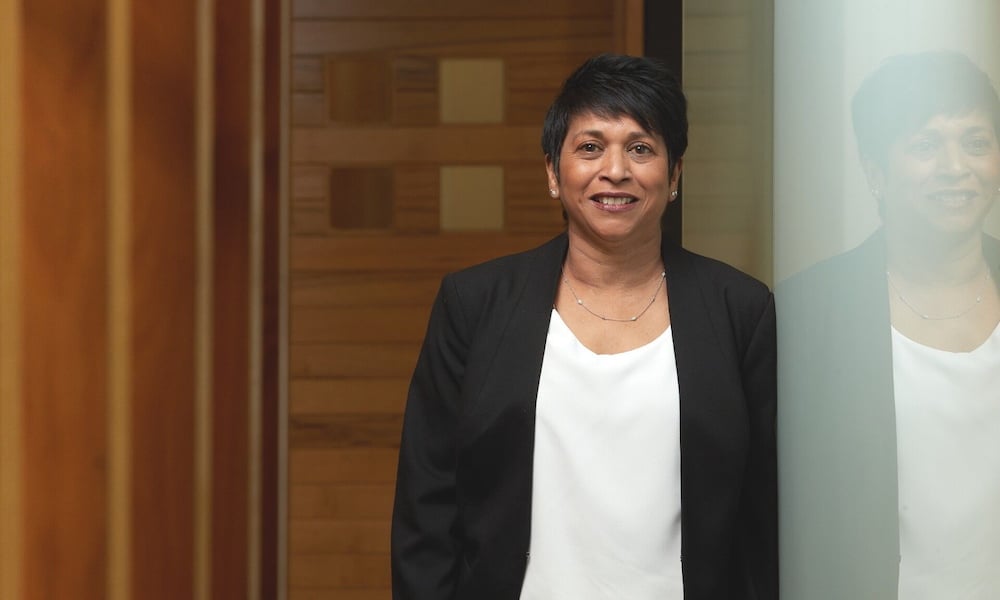
Jo Naidoo also talks how growing up during apartheid helped introduce her to injustice early on

Jo Naidoo came to understand unfairness and injustice at a young age. The family law specialist, who is a partner on the family disputes team at Norris Ward McKinnon (NWM), experienced growing up in South Africa in the midst of apartheid, and that background became a factor in her eventual foray into law.
Today, meeting people of varied backgrounds is a part of the job that Naidoo said she finds “very rewarding and interesting.” And with the COVID-19 pandemic changing the way law firms operate, she champions the need to practise law more sustainably and for the legal profession to continue to determine more innovative ways to assess justice.
In this interview, Naidoo also talks about maintaining a sense of humour through hard times, the benefits of flexible work setups and the need to disconnect from work in a stressful and demanding profession.
What made you choose a career in law?
I grew up in South Africa during the apartheid years. I think this led me to understand unfairness and injustice when I was quite young. I enjoyed a good debate and was able to hold my end up; naturally a career in law seemed a logical choice.
What do you love most about your job?
There is a constant variety of work opportunities in family law. I can be involved in anything from representing someone in a parenting dispute, assisting with the division of relationship property or complex disputes about estates. The different work means that I come into contact with people from different backgrounds on a daily basis, which is very rewarding and interesting. I enjoy the challenges of litigation – regardless of the type of work.
What is going on at the firm? Are there any new programs and initiatives that you’re particularly interested in?
NWM recently adopted a flexible working programme across the whole firm. We recognised the importance of work/life balance and that people have different lifestyles and time commitments outside of our firm. We realised that we don’t need prescribed hours to get work done (except for court), and flexibility has allowed us to spend time with children or older family members when we need to while still getting our work done. The benefits of offering flexibility to all of our staff have seen a happier team and firm.
What has been your proudest accomplishment in the last year or so?
Shortly after losing two senior lawyers to retirement this year, we employed a number of junior lawyers into our family disputes team. It has been rewarding to train them and to watch them develop new skills and progress from being new law clerks to lawyers able to represent clients at a hearing. We have a strong, cohesive team who are very supportive of each other, and I’m very proud to see how well they gel and how capable they are.
What’s the biggest lesson you learned in the past year and what advice can you give fellow lawyers about it?
The sudden and unexpected lockdown for COVID-19 changed the way we worked, interacted with clients and attended court. Overnight, we went from a group of professionals working together at the office to working together in different parts of the city, but with the same responsibilities to our clients. I found that strong relationships and good communication between team members was a key factor in our success as a firm, and that we often relied on our sense of humour to get us through the tough times.
What should the profession and law firms focus more on?
Email, mobile phones and the internet mean that you are always “on duty” and contactable. The practice of law is stressful and demanding, and there should be a focus on the need to disconnect and get away from work. We often push people to connect with others, but disconnecting is also crucial to recharge the batteries and be able to take a step back from issues and see things more clearly.
What are the challenges you expect in your practice, and in the business of law in general, going forward?
The need to practice law in a more sustainable way – i.e., the paperless office. There is no provision for the use of electronic documents at the District Court and Family Court levels, and we continue to use excessive amounts of paper.
What challenges are particularly pressing in the country’s legal industry?
There are usually long waits for hearings in the District Court. Litigants and lawyers can spend a long time at court waiting for their case to be called before a judge.
During the lockdown we learned suddenly that lawyers and litigants did not have to be at court together for a judge to hear their case. Evidence was heard via audio visual link, and lawyers attended court by phone from home. We found out that technology could make the administration of justice efficient but still fair. The challenge will be for us to continue to develop these innovative ways of assessing justice.
What are you looking forward to the most in the coming year?
Time to unwind over Christmas, the hope of travelling overseas next year, and the continuation of the movement to “be kind”, “support local” and appreciate the small things in life.